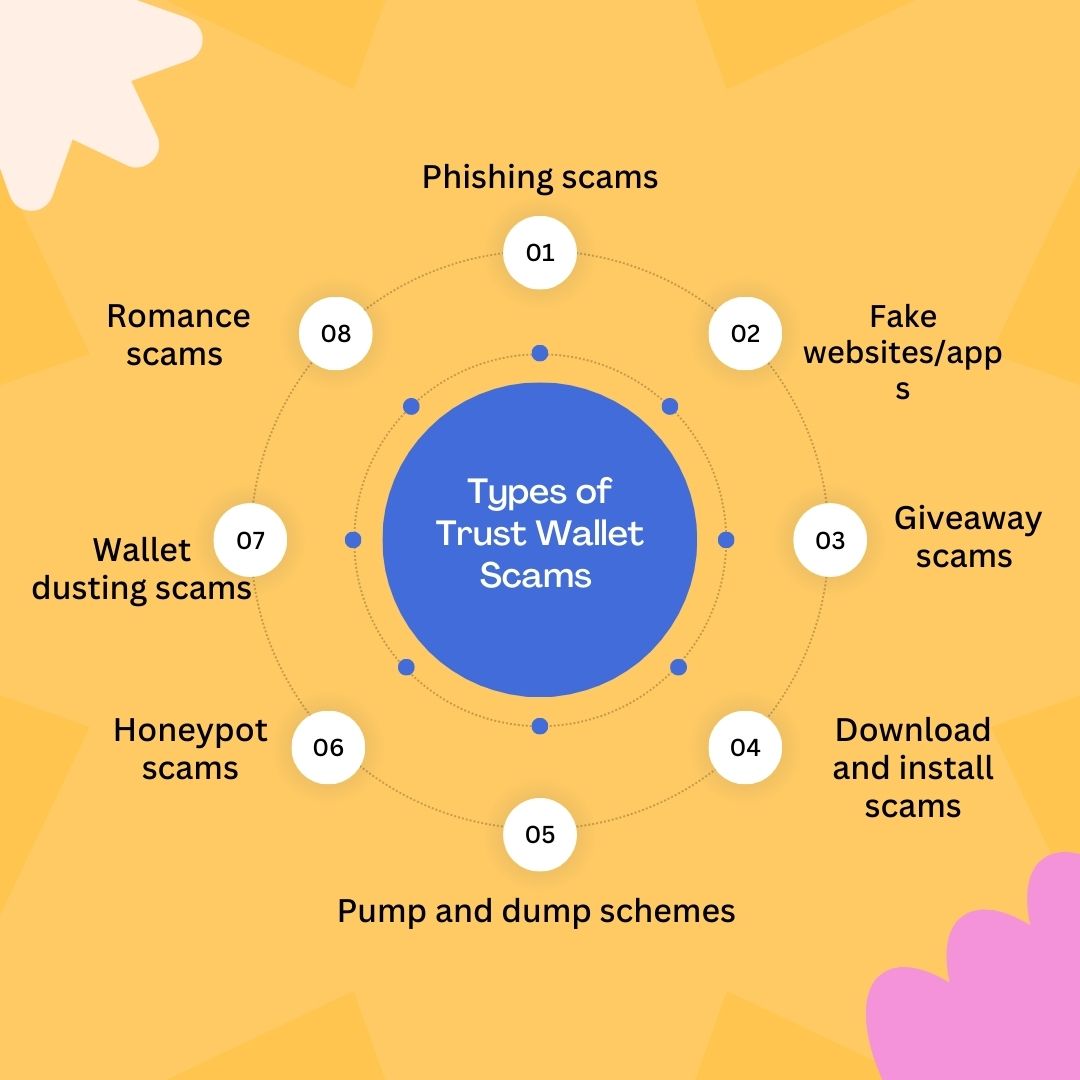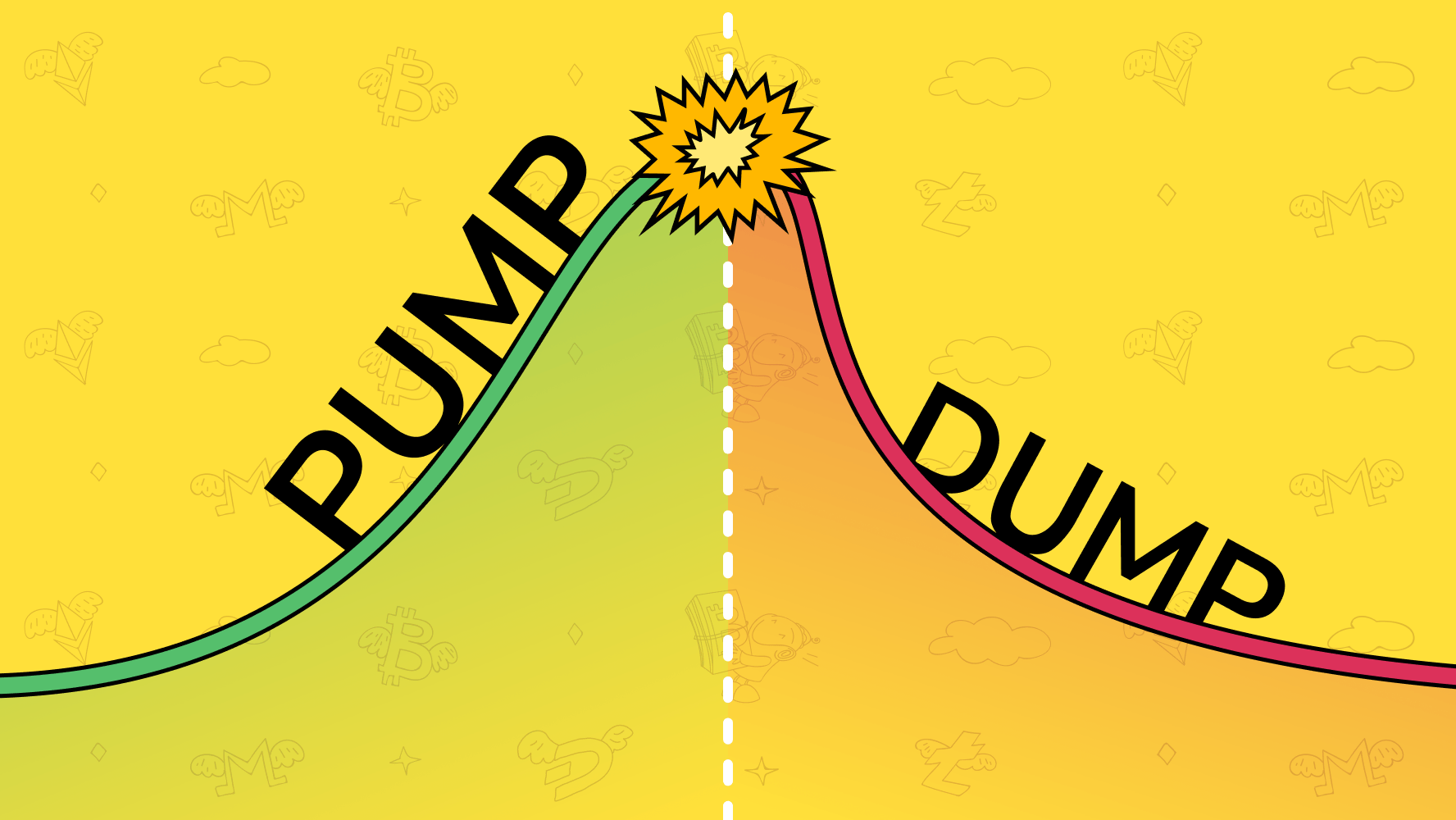Trust Wallet Scams: What Are They & How to Protect Yourself
The popularity of cryptocurrency use, including apps like Trust Wallet, has unfortunately drawn the attention of cyber criminals. As a result, frauds involving Trust Wallet are increasingly happening.
A notable incident happened towards the end of 2022. The tricksters pretended to be Web3 investors. They organized face-to-face meetings under the pretense of verifying the funds’ presence. Their operations were not limited to a single region, affecting users in various cities worldwide like Mila and Barcelona.
This unfortunate incident underlines the real risks users face in cryptocurrency. It’s a wake-up call about staying vigilant and well-informed to avoid fraud. This article will discuss everything you need to know about Trust Wallet scams and how to avoid them.
What was the scam of 2022 all about?
In February 2022, an emerging metaverse ⓘ company, Webaverse, fell prey to a scam that cost them a huge $4 million. The culprits acted as prospective investors, convincing the Webaverse team to meet them in person.
During this meeting, the team was deceived into installing a harmful application on their mobile devices. This action gave the scammers the key to their Trust Wallets.
The trick lay in the harmful app the scammers used. This was a decoy version of the Trust Wallet app. It was a near-perfect imitation of the original in appearance and operation. However, it was quite malicious and designed to steal the user’s secret seed phrase.
This seed phrase, a 12-word string, is employed to generate the private keys needed to access a cryptocurrency wallet. Once the scammers had their hands on the seed phrase, they had unhindered access to the Webaverse team’s Trust Wallets.
This Trust Wallet scam serves as a sobering reminder of the risks inherent in cryptocurrency, given its novelty and lack of regulation. With numerous frauds and hacks targeting cryptocurrency users, it’s crucial to stay informed of these hazards and take necessary measures to safeguard your digital assets.
How the common trust wallet scams take place?

There is a scam website that falsely represents Trust Wallet, typically introduced to unsuspecting users through phishing emails.
These emails falsely claim that a Trust Wallet account is yet to be verified and urge users to complete the process by clicking on the “Verify your wallet” option or by following an included link.
Clicking on these links takes users to a fraudulent Trust Wallet website. Here, they’re asked to enter their passphrases. Passphrases in Trust Wallet are a key recovery mechanism used when wallets are lost, damaged, stolen, or inaccessible.
Unfortunately, entering this passphrase into the bogus site grants the fraudsters full access to users’ wallets, usually leading to losing all their cryptocurrency.
In certain instances, these fraudsters had even asked victims to transfer their funds to a different wallet in advance.
The victims were also instructed to download a counterfeit Non-Disclosure Agreement (NDA)and Know Your Customer (KYC) information, which Trust Wallet suspects contained harmful software.
Types of trust wallet scams and How to avoid them

Always keep an eye out for the most recent fraudulent schemes. Crooks are tirelessly devising innovative methods to rob you of your cryptocurrency. Being informed about these latest scams of the trade is crucial in keeping yourself safe from such threats.
1. Phishing Scams
Phishing scams are crafty schemes where tricksters pretend to be credible organizations to get hold of your confidential data like passwords or seed phrases. One such trick might see a cheat acting as Trust Wallet’s support staff, emailing about a security problem with your wallet and asking you to confirm your seed phrase.
Remember never to share your private keys or recovery phrases with anyone to stay safe from such scams. Also, always make sure to check the authenticity of any communication. Remember that legitimate platforms won’t ask you for such sensitive information, even over the phone.
2. Fake Websites/Apps
In this type of scam, fraudsters design bogus websites or apps that mimic authentic services like Trust Wallet. Unsuspecting users can enter their login details into these platforms, which the fraudsters then steal.
Consider a scenario where a user downloads a phony Trust Wallet app from an unofficial source and inputs their private keys. This action gives the scammers unauthorized access to the user’s actual wallet. You can avoid this by always verifying URLs and downloading apps only from official app stores.
Actually Good Websites...
3. Giveaway Scams
Giveaway scams lure victims with the promise of substantial returns for minor crypto investments. These enticing ‘giveaways’ are usually promoted on social media or other online platforms.
For instance, a scammer might create a fake Twitter account imitating a prominent individual, announcing a Bitcoin giveaway with a pledge to double any amount sent.

The best way to avoid this scam is by maintaining a healthy level of uncertainty toward any offer that appears overly beneficial. Never send money or crypto expecting you’ll receive more back.
4. Download and install scams
Fraudsters sometimes deceive users into downloading harmful software by promising improvements or solutions for their wallet’s security. Here’s a common situation: a user gets an email encouraging them to download a ‘security update’ for their Trust Wallet.
However, this software might carry a keylogger, a tool designed to record user keystrokes and consequently steal their private keys.
To avoid such scams, only download software from trusted sources. Be cautious of unexpected requests to download software. We have our own dedicated guide on tech support scams and how you can avoid them. Be sure to check it out for a leg up on bad actors.
5. Pump and dump schemes
Pump and dump schemes are manipulative tactics where scammers artificially drive up a token’s price, persuade others to invest, and then abruptly sell off their holdings, which leads to a drastic price drop.
A common scenario might involve a Telegram group hyping up a low-value token to artificially inflate its price. The group’s administrators then offload their tokens, causing a significant price plunge and substantial losses for other members.
Shield yourself from such plots by maintaining an up-to-date understanding of the tokens you invest in and exercising caution with unexpected and unexplained price spikes.

6. Honeypot scams
In honeypot scams, tricksters create a new cryptocurrency that investors can purchase, but they can’t sell it due to certain restrictions in the token’s code.
After buying the token, investors find themselves stuck with a token they can’t sell, essentially worthless. To avoid falling prey to honeypot scams, always conduct detailed research and strive to understand the code behind any new token you’re considering investing in.
7. Wallet Dusting Scams
Wallet dusting deceptions work by sending small amounts of cryptocurrency, or “dust,” to numerous digital wallets. Scammers can then exploit the transaction history to pinpoint individuals for specific phishing or other attacks.
For instance, you might notice a small, unexpected amount of cryptocurrency in your wallet, which could be a part of a dusting attempt. If you spot such a transaction, it’s advisable not to move the dust, as it can lead to the disclosure of your wallet address.
8. Romance Scams
Romance scams have sadly made their entrance into the cryptocurrency world. Tricksters create fake profiles on dating sites or social media. Once they’ve won their victim’s trust, they can request money to be transferred to their cryptocurrency wallet for various reasons.
Due to the finality of these exchanges, fraudsters can keep the funds for themselves. To evade such scams, exercise caution when considering sending money to people you’ve only interacted with online. Never send crypto to someone unless you trust them completely.
General tips for avoiding trust wallet scams

Here are the condensed tips to avoid scams related to Trust Wallet or other digital wallets:
- Keep private keys or recovery phrases to yourself. They’re your credentials for accessing your wallet.
- Be careful of emails or messages asking for sensitive data. Verify the source; legitimate platforms won’t ask for your keys or phrases.
- Download apps only from official stores and validated sources to avoid fake platforms.
- Verify the URL when visiting Trust Wallet or other sites. A small typo could direct you to a scam site.
- Beware of offers promising huge returns for a small investment. ‘Giveaway’ scams typically ask for some crypto with a pledge to send back more.
- Conduct comprehensive research before allocating resources to a new token. Be suspicious if purchasing is possible but selling is restricted.
- It could be a dusting attempt if you receive a small, unexplained crypto amount. Avoid moving these funds.
- Stay vigilant of pump and dump schemes. If a coin’s value spikes suddenly, research why.
- Scams evolve over time. Keep abreast to shield yourself.
- Report suspicious activities to Trust Wallet or the relevant support team. They can’t act on unknown scams.
 Reviewed by
Reviewed by 




